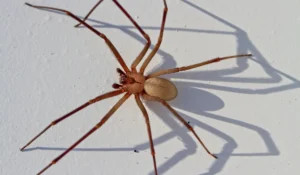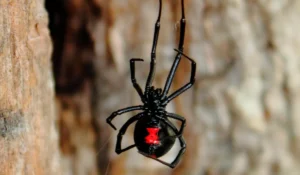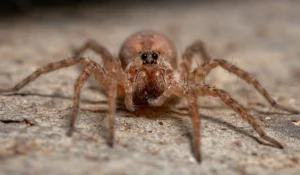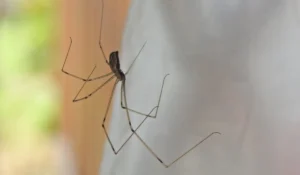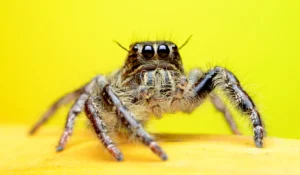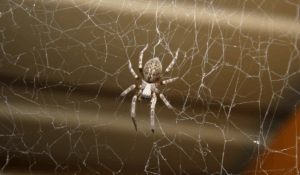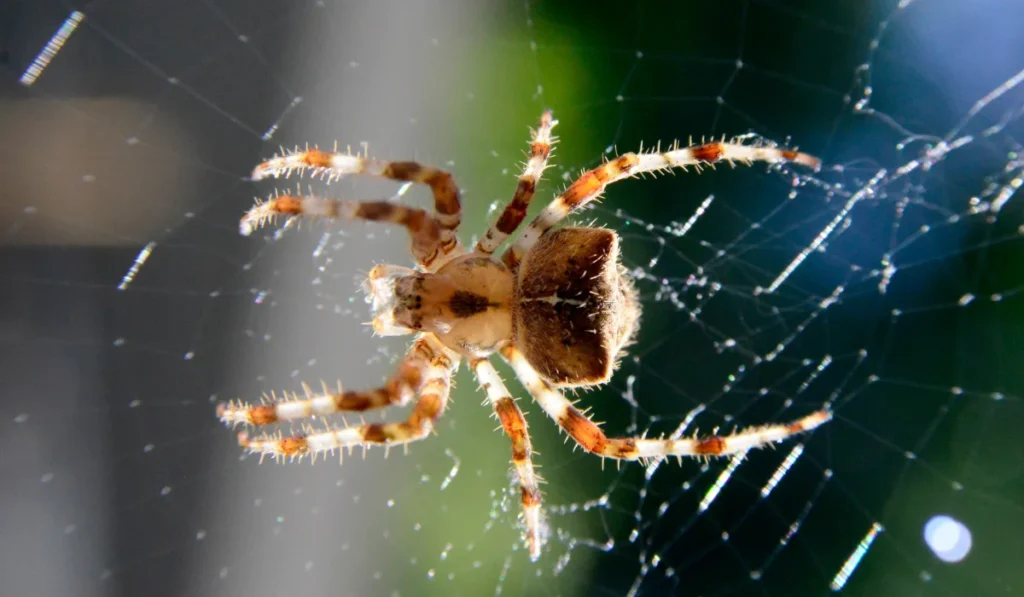
Spiders don’t vanish in Alabama winters; they move indoors where it’s warm. This behavior is called ‘overwintering,’ and it often happens in attics, basements, crawl spaces, and garages.
Alabama has many spiders. Brown recluse, black widow, and wolf spiders are the most concerning. Homes also host harmless house spiders that leave messy webs and egg sacs. Because Alabama winters are mild, spiders survive indoors. If they settle in now, they can boom in spring.
Homeowners in Birmingham, Huntsville, and statewide deal with winter spider activity every year. This guide explains why spiders overwinter, which species you may see, where they hide, and how to prevent them. You’ll also learn when to call a professional.
Key Takeaways:
- In Alabama, overwintering spiders move inside during cold weather and hide in attics, basements, and crawl spaces.
- Common Alabama species include brown recluse, black widow, wolf spiders, and orb-weavers.
- Spiders enter through small gaps and stay near storage, woodpiles, and clutter.
- Professional pest control helps prevent spiders and other pests, like termites.
Why overwintering spiders invade Alabama homes
As the weather cools in early fall, spiders look for safe shelter and slip indoors. Many arachnids, such as orb-weavers and house spiders, enter a resting state called diapause. Their bodies slow down so they can make it through winter.
Spiders come inside for warmth, quiet hiding spots, and steady insect food. Females leave egg sacs in storage. In spring, they hatch, and numbers jump. Stopping them early prevents a bigger problem.
Common spider species in Alabama homes
Some spiders are harmless; others demand care. As the weather cools, several species move indoors to survive winter.
Orb-weavers
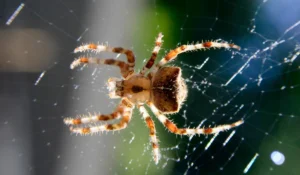
Orb-weavers spin large, round webs in gardens, porches, and sheds. Their egg sacs may ride in on boxes and end up hatching indoors.
Brown recluse spiders

Brown recluse spiders like dark, quiet spots such as garages, attics, and crawl spaces. Bites can be painful and may need medical attention.
Black widow spiders

Black widow spiders often hide in woodpiles, storage areas, or dark corners. Their venom is potent, so spotting one indoors should be taken seriously.
Wolf spiders

Wolf spiders are large, fast hunters. They don’t use webs; they chase insects in basements, garages, and near doors. They look scary, but rarely bite.
Cellar spiders

Cellar spiders, or “daddy longlegs,” have long, thin legs and spin messy webs in basement, attic, and ceiling corners. They’re harmless and eat small insects and other spiders.
Jumping spiders
Jumping spiders are small, but they have big eyes. They don’t build webs; they leap to catch insects. You may see them on windowsills, walls, or ceilings. They’re harmless.
House spiders

House spiders are very common indoors in Alabama. They spin thin webs in closets, boxes, and room corners. They’re a nuisance, but they rarely bite and can help reduce other pests.
Spider species in Alabama: Dangerous vs. Harmless
| Spider species | Where they hide | Risk level |
|---|---|---|
| Brown recluse spider | Garages, attics, crawl spaces | Dangerous, bites may need medical attention |
| Black widow spider | Woodpiles, storage areas, dark corners | Dangerous, venomous bite |
| Orb-weaver | Gardens, porches, sheds, attics (egg sacs) | Mostly harmless, nuisance webs |
| Wolf spider | Basements, garages, near doors | Harmless, large but non-aggressive |
| Cellar spider | Ceilings, basements, corners | Harmless, sometimes called “daddy longlegs” |
| Jumping spider | Windowsills, walls, inside homes | Harmless, active hunters |
| House spider | Storage boxes, closets, corners | Harmless, common indoor arachnid |
Where spiders hide during the winter months
Indoors, overwintering spiders choose dark, quiet places. Attics (with boxes and insulation), basements, crawl spaces, garages, and storage rooms are common hiding spots.
Even tiny crevices around doors, windows, and vents can serve as entry points. Once inside, spiders spin webs in corners, behind furniture, or near ceilings.
How to prevent spider infestations in Alabama
The best way to stop overwintering spiders in Alabama is to block entry. Seal gaps around windows, doors, and the foundation. Add door sweeps and weather-stripping. Keep crawl spaces, basements, and attics clean and clutter-free, especially in early fall.
Clean often. Vacuum webs, remove egg sacs, and check boxes before you bring them inside. Store items in sealed plastic bins. Move woodpiles away from the house, and clear leaf litter. These areas attract insects and the spiders that hunt them.
Because spiders eat other bugs, reducing ants, roaches, and flies also lowers spider numbers. A pest control service can treat spiders and other pests, including termites, for year-round protection.
When to call a pest control service
Many spiders aren’t dangerous, but some are. If you see a brown recluse, a black widow, many webs, or egg sacs, call a professional.
Magic City Pest Control can inspect your home, find hiding spots, and treat areas where spiders overwinter. We focus on attics, crawl spaces, basements, and garages. Our team also helps protect against other pest problems, so you won’t have to worry about termites, ants, or roaches while dealing with spiders.
Making the right choice for spider control in Alabama
Winter can drive more spiders indoors across Alabama. If you’re seeing activity, choose a service that fits your home and budget. Magic City Pest Control provides fast inspections, targeted spider treatments, and follow-up visits through spring.
You’ll get a clear plan, easy scheduling, family- and pet-friendly options, and straightforward pricing backed by a simple guarantee.
Contact us today and start this season with fewer worries and a spider-free home.
FAQs
Why do spiders overwinter in Alabama homes?
Spiders overwinter indoors to survive the cold months. They go into diapause and often hide in attics, crawl spaces, basements, or garages until spring.
Are brown recluse and black widow spiders dangerous?
Yes. Both brown recluse spiders and black widow spiders live in Alabama. Their bites can be harmful, and in some cases, you may need medical attention.
How can I keep spiders out of my home during the winter months?
Seal entry points, clean storage areas, and remove woodpiles or leaf litter near your home. For lasting protection, schedule a pest control service that treats both spiders and other pests, such as termites.

